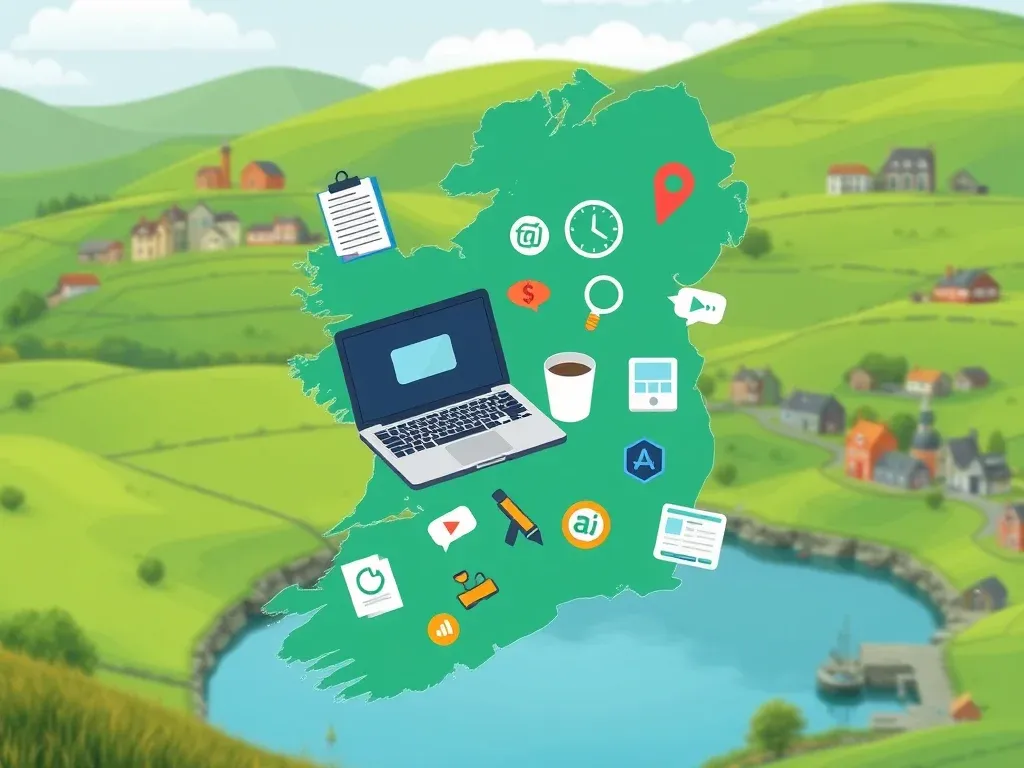Table of Contents
- Table of Contents
- Introduction
- Pro Tip
- The Freelance Landscape in Ireland
- Current State of the Gig Economy
- Popular Freelance Industries
- Freelancer Demographics
- Regional Variations
- Pro Tip
- Legal and Tax Requirements
- Business Structure Options
- Tax Obligations
- Insurance Requirements
- Contracts and Agreements
- Pro Tip
- Finding Freelance Opportunities
- Online Platforms and Marketplaces
- Networking Strategies
- Direct Outreach
- Agency Relationships
- Pro Tip
- Pricing Your Services
- Market Research and Benchmarking
- Pricing Models
- Calculating Your Minimum Viable Rate
- Negotiation Strategies
- Pro Tip
- Client Relationship Management
- Setting Expectations
- Professional Communication
- Managing Difficult Situations
- Client Retention Strategies
- Pro Tip
- Financial Management for Freelancers
- Invoicing Best Practices
- Managing Irregular Income
- Expense Management and Deductions
- Financial Planning and Pensions
- Pro Tip
- Productivity and Tools
- Essential Software and Services
- Workspace Optimization
- Time Management Techniques
- Automation and Efficiency
- Pro Tip
- Work-Life Balance as a Freelancer
- Setting Boundaries
- Preventing Burnout
- Physical and Mental Wellbeing
- Integrating Personal and Professional Goals
- Pro Tip
- Industry-Specific Insights
- Technology and Development
- Creative and Design
- Marketing and Communications
- Professional Services
- Pro Tip
- Building Your Reputation and Brand
- Professional Online Presence
- Content Marketing and Thought Leadership
- Testimonials and Social Proof
- Networking and Referrals
- Pro Tip
- Scaling Your Freelance Business
- Growth Strategies
- Building a Freelance Team
- Agency Transition
- Digital Products and Passive Income
- Pro Tip
- Common Challenges and Solutions
- Feast or Famine Cycles
- Isolation and Motivation
- Difficult Clients
- Market Changes and Competition
- Pro Tip
- Future Trends in Irish Gig Economy
- Emerging Opportunities
- Regulatory Developments
- Technology and Platform Evolution
- Preparing for Future Changes
- Pro Tip
- Conclusion
- Related Posts
Freelancing and Gig Economy in Ireland: Guide to Success
Reading time: 15 minutes
The freelance and gig economy landscape in Ireland is rapidly evolving, offering flexible work opportunities across numerous industries. This comprehensive guide explores the essentials of successful freelancing in Ireland, from legal and tax considerations to finding clients, setting rates, and building a sustainable independent career in the Irish market.
Introduction
The world of work is changing rapidly, with freelancing and gig work becoming increasingly prevalent across the globe. Ireland, with its dynamic economy and growing tech sector, has seen significant growth in independent work arrangements over the past decade. Whether by choice or necessity, more Irish professionals are turning to freelancing, contract work, and gig economy platforms to build flexible careers that align with their skills, interests, and lifestyle preferences.
Freelancing in Ireland offers numerous advantages: the freedom to choose projects, flexibility in working hours and location, potential for higher earnings, and the opportunity to build a diverse portfolio of work. However, it also comes with unique challenges, including irregular income, self-management of taxes and benefits, client acquisition, and maintaining work-life boundaries.
This guide is designed to help both new and experienced freelancers navigate the Irish independent work landscape successfully. We’ll explore the legal and practical aspects of freelancing in Ireland, strategies for finding and retaining clients, financial management best practices, and approaches to building a sustainable and rewarding freelance career in the Irish market.
Pro Tip
Before diving fully into freelancing in Ireland, consider starting as a side hustle while maintaining some stable income. This approach allows you to test the market, build a client base, and refine your services without the immediate pressure of generating full-time income. Many successful Irish freelancers began their independent careers this way, gradually transitioning to full-time freelancing as their client base and confidence grew.
The Freelance Landscape in Ireland
Current State of the Gig Economy
Ireland’s gig economy has experienced substantial growth, particularly in Dublin and other urban centers. According to recent studies, approximately 15-20% of the Irish workforce engages in some form of independent work, with numbers continuing to rise. This growth has been fueled by several factors, including:
- The expansion of Ireland’s tech sector and the presence of multinational companies
- Increasing adoption of remote work policies following the COVID-19 pandemic
- The rise of digital platforms connecting freelancers with clients
- Growing preference for work flexibility among younger professionals
- Skills shortages in specialized areas, creating opportunities for expert freelancers
Popular Freelance Industries
While freelancing opportunities exist across virtually all sectors in Ireland, certain industries have particularly strong demand for independent professionals:
- Technology: Software development, web design, app development, IT consulting, cybersecurity
- Creative Services: Graphic design, content creation, photography, videography, animation
- Marketing and Communications: Digital marketing, social media management, PR, copywriting
- Professional Services: Accounting, legal consulting, business analysis, project management
- Education and Training: Online tutoring, course development, corporate training
- Healthcare: Telehealth services, medical writing, health consulting
Freelancer Demographics
The freelance workforce in Ireland is diverse, spanning different age groups, backgrounds, and skill levels. However, certain patterns have emerged:
- Millennials and Gen Z professionals are more likely to choose freelancing as a primary career path
- Mid-career professionals often turn to freelancing for better work-life balance or to escape corporate environments
- Experienced professionals near retirement age may freelance to extend their careers on more flexible terms
- International professionals living in Ireland frequently use freelancing as an entry point into the Irish labor market
Regional Variations
While freelancing opportunities exist throughout Ireland, there are notable regional differences:
- Dublin: Highest concentration of freelance opportunities, particularly in tech, finance, and creative industries
- Cork, Galway, Limerick: Growing freelance communities with strong demand in tech, education, and healthcare
- Rural Areas: Increasing opportunities due to remote work adoption, though often requiring stronger online networking skills
Pro Tip
Join industry-specific freelancer communities in Ireland to gain insider knowledge about market rates, client expectations, and opportunity sources. Groups like Freelance Ireland, Creative Mornings Dublin, and various LinkedIn and Facebook communities provide valuable networking and information-sharing platforms. These communities can be particularly helpful for understanding the nuances of the Irish market if you’re coming from another country.
Legal and Tax Requirements
Business Structure Options
As a freelancer in Ireland, you have several options for structuring your business, each with different implications for taxes, liability, and administration:
- Sole Trader: The simplest structure, where you operate as an individual. You must register with Revenue as a self-employed person and file an annual tax return. While straightforward to set up, this structure doesn’t separate personal and business liabilities.
- Limited Company: Creates a separate legal entity for your business. Offers better liability protection but involves more administrative requirements, including company registration with the Companies Registration Office (CRO), annual returns, and potentially higher accounting costs.
- Partnership: Suitable if you’re working with others. Each partner is jointly liable for business debts, and profits are shared according to the partnership agreement.
Most freelancers in Ireland start as sole traders due to the simplicity, transitioning to a limited company structure as their business grows or when liability concerns become more significant.
Tax Obligations
Understanding and managing your tax obligations is crucial for freelancers in Ireland:
- Income Tax: Freelancers pay income tax through the self-assessment system. You’ll need to file an annual tax return (Form 11) by October 31st each year (or November with online filing).
- Universal Social Charge (USC): An additional tax applied to your gross income at progressive rates.
- Pay Related Social Insurance (PRSI): Self-employed individuals pay Class S PRSI, currently at 4% of all income.
- Value Added Tax (VAT): If your turnover exceeds €37,500 for services in a 12-month period, you must register for and charge VAT. Even below this threshold, you can voluntarily register if it benefits your business.
- Preliminary Tax: You must pay preliminary tax (an estimate of your current year’s liability) by October 31st each year.
Insurance Requirements
While not all insurance is legally mandated, certain types are essential or highly recommended for freelancers:
- Professional Indemnity Insurance: Covers claims arising from professional negligence or mistakes. Essential for consultants, advisors, and anyone providing professional services.
- Public Liability Insurance: Important if clients visit your premises or if you work at client locations.
- Income Protection Insurance: Provides income if you’re unable to work due to illness or injury—particularly important as freelancers don’t have employer sick pay.
- Cyber Insurance: Increasingly important for freelancers handling sensitive data or providing digital services.
Contracts and Agreements
Working with proper contracts is vital for protecting your freelance business:
- Client Contracts: Should clearly outline scope of work, deliverables, timelines, payment terms, intellectual property rights, and termination conditions.
- Non-Disclosure Agreements (NDAs): Important when handling sensitive client information.
- Terms and Conditions: Standard terms that apply to all your client relationships.
While template contracts are available online, it’s advisable to have an Irish solicitor review your standard contracts to ensure they comply with Irish law and adequately protect your interests.
Pro Tip
Set aside 30-40% of each payment you receive for taxes. Irish income tax rates can reach up to 40% for higher earners, plus USC and PRSI. Maintaining a separate savings account specifically for tax obligations helps ensure you’re prepared when payment is due. Additionally, consider using accounting software like QuickBooks, Xero, or Irish-specific options like Big Red Cloud to track income, expenses, and tax liabilities throughout the year.
Finding Freelance Opportunities
Online Platforms and Marketplaces
Digital platforms offer accessible entry points for finding freelance work in Ireland:
- Global Freelance Platforms: Upwork, Fiverr, Freelancer.com, and PeoplePerHour host opportunities across various industries.
- Specialized Platforms: Industry-specific platforms like Toptal (tech), Behance (creative), Contently (writing), or Codeable (WordPress) often feature higher-quality opportunities.
- Irish-Focused Platforms: Sites like Jobbio, Jobs.ie, and Irish DevJobs often list contract and freelance opportunities specifically in the Irish market.
- Remote Work Platforms: We Work Remotely, Remote.co, and FlexJobs feature location-independent opportunities accessible to Irish freelancers.
When using these platforms, complete your profile thoroughly, showcase relevant portfolio pieces, and consider starting with smaller projects to build positive reviews before pursuing larger opportunities.
Networking Strategies
In Ireland’s relationship-oriented business culture, networking remains one of the most effective ways to secure quality freelance work:
- Industry Events: Attend conferences, seminars, and meetups relevant to your field. Events hosted by Enterprise Ireland, industry associations, and chambers of commerce can be particularly valuable.
- Coworking Spaces: Joining spaces like Dogpatch Labs, Glandore, or WeWork can connect you with potential clients and collaborators.
- Professional Associations: Organizations like the Marketing Institute of Ireland, the Institute of Designers in Ireland, or Engineers Ireland offer networking opportunities and sometimes job boards.
- Alumni Networks: University and college alumni associations often maintain active professional networks.
- LinkedIn: Actively engage with Irish business communities on LinkedIn by sharing insights, commenting on industry developments, and directly connecting with potential clients.
Direct Outreach
Proactive outreach to potential clients can yield high-quality opportunities:
- Targeted Prospecting: Identify companies that could benefit from your services and research their specific needs or challenges.
- Personalized Pitches: Develop customized proposals addressing how your skills can solve specific problems for each prospect.
- Cold Emailing: While response rates are typically low, well-crafted cold emails to decision-makers can open doors, especially when you demonstrate knowledge of their business.
- Follow-Up Strategy: Develop a systematic approach to following up with prospects without being intrusive.
Agency Relationships
Recruitment and staffing agencies can be valuable sources of freelance opportunities:
- Specialized Recruiters: Agencies like Morgan McKinley, Prosperity, and Cpl often have dedicated contract and freelance divisions.
- Creative and Marketing Agencies: Many Irish agencies hire freelancers for client projects or overflow work.
- Building Agency Relationships: Maintain regular contact with recruiters in your field, updating them on your availability and new skills.
Pro Tip
Develop a diverse opportunity sourcing strategy rather than relying on a single channel. Successful Irish freelancers typically combine platform work, direct clients, and agency relationships to create a stable pipeline of projects. This approach not only provides income security but also helps you identify which channels yield the most profitable and enjoyable work for your specific skills and services.
Pricing Your Services
Market Research and Benchmarking
Setting appropriate rates begins with understanding the Irish market for your services:
- Industry Surveys: Review freelance rate surveys from organizations like the Association of Freelance Professionals Ireland or global reports with Irish data.
- Competitor Analysis: Research what other freelancers with similar experience and skills charge in the Irish market.
- Client Budget Research: Understand typical budget ranges for different types of clients (startups, SMEs, enterprises, public sector).
- Regional Variations: Recognize that rates may vary between Dublin and other regions, with Dublin typically supporting higher rates.
Pricing Models
Consider which pricing structure best suits your services and client expectations:
- Hourly Rates: Common for consulting, development, and services where scope may change. Typical professional hourly rates in Ireland range from €30-€150 depending on specialization and experience.
- Project-Based Pricing: Charging a fixed fee for defined deliverables. Requires careful scope definition but can be more attractive to clients seeking budget certainty.
- Retainer Arrangements: Monthly fees for ongoing services or guaranteed availability. Popular for marketing, content creation, and advisory services.
- Value-Based Pricing: Setting fees based on the value delivered rather than time spent. Most effective for services with measurable business impact.
- Day Rates: Common for on-site work or intensive consulting, typically calculated as 7-8 times your hourly rate.
Calculating Your Minimum Viable Rate
Determine the minimum you need to charge to sustain your business:
- Calculate your annual business expenses (software, insurance, equipment, office space, professional development)
- Add your desired annual salary and tax provisions
- Factor in non-billable time (marketing, administration, holidays, sick days)
- Divide by your expected billable hours per year
For example, if you aim to earn €50,000 personally, with €10,000 in business expenses and expect to bill 1,000 hours annually, your minimum hourly rate would need to be €60 plus provisions for taxes.
Negotiation Strategies
Effective negotiation is essential for maintaining profitable rates:
- Value Communication: Clearly articulate the ROI and benefits clients receive from your services.
- Tiered Offerings: Provide different service packages at various price points.
- Non-Price Negotiables: Consider adjusting project scope, timeline, or payment terms rather than reducing your rate.
- Confidence: Present your rates confidently without apology or excessive justification.
- Walking Away: Be prepared to decline opportunities that don’t meet your minimum viable rate.
Pro Tip
Regularly review and increase your rates as you gain experience and expertise. Many successful Irish freelancers schedule annual rate reviews and implement modest increases (5-10%) for new clients. For existing clients, provide advance notice (typically 1-3 months) of rate changes and explain the value justification. This approach helps your freelance business keep pace with inflation and reflects your growing expertise.
Client Relationship Management
Setting Expectations
Clear expectations form the foundation of successful client relationships:
- Detailed Proposals: Provide comprehensive proposals outlining deliverables, timelines, processes, and responsibilities.
- Onboarding Process: Develop a structured process for bringing on new clients, including questionnaires, kickoff meetings, and resource sharing.
- Communication Guidelines: Establish preferred communication channels, response times, and meeting cadences upfront.
- Scope Management: Clearly define what constitutes scope changes and how these will be handled and billed.
Professional Communication
Effective communication is particularly important in the Irish business context:
- Cultural Awareness: Understand Irish communication styles, which often blend professionalism with personability and may be less direct than in some other cultures.
- Regular Updates: Provide proactive progress reports without waiting to be asked.
- Documentation: Follow up verbal discussions with written summaries to ensure alignment.
- Responsiveness: Acknowledge messages promptly, even if a full response requires more time.
- Problem Communication: Address issues or delays early with proposed solutions rather than just reporting problems.
Managing Difficult Situations
Navigate challenging client scenarios professionally:
- Scope Creep: Address additional requests diplomatically by acknowledging the request, explaining its impact on the current agreement, and offering options.
- Payment Delays: Implement clear payment terms with staged payments for larger projects and follow a systematic reminder process for overdue invoices.
- Feedback Integration: Receive criticism constructively while distinguishing between subjective preferences and objective improvements.
- Relationship Rescue: When projects go off track, focus on solutions rather than blame and consider face-to-face meetings for sensitive discussions.
Client Retention Strategies
Maintaining long-term client relationships is more cost-effective than constantly acquiring new clients:
- Exceeding Expectations: Deliver more value than promised, whether through quality, timeliness, or additional insights.
- Proactive Value Addition: Share relevant articles, resources, or ideas that benefit your client’s business beyond your specific deliverables.
- Relationship Building: Understand your client’s business goals and challenges beyond your immediate project.
- Regular Check-ins: Schedule periodic relationship reviews to ensure ongoing satisfaction and identify new opportunities.
- Loyalty Programs: Consider offering long-term client discounts, priority scheduling, or other benefits for ongoing relationships.
Pro Tip
Develop a systematic approach to gathering and implementing client feedback. After completing projects, send a brief survey or schedule a debrief call to understand what worked well and what could be improved. This practice not only helps refine your services but also demonstrates your commitment to excellence and client satisfaction. Many successful Irish freelancers attribute their business growth primarily to referrals from satisfied clients.
Financial Management for Freelancers
Invoicing Best Practices
Professional invoicing is crucial for maintaining cash flow:
- Invoice Elements: Include your business details, client information, invoice number, issue date, payment terms, itemized services, rates, VAT (if applicable), and payment methods.
- Timing: Invoice promptly upon project completion or at predetermined milestones for longer projects.
- Payment Terms: Clearly state payment deadlines (14-30 days is standard in Ireland) and accepted payment methods.
- Follow-up System: Implement a consistent process for tracking and following up on unpaid invoices.
- Professional Templates: Use well-designed invoice templates that reflect your brand and professionalism.
Managing Irregular Income
Strategies for handling the financial uncertainty of freelancing:
- Emergency Fund: Build a financial buffer covering 3-6 months of expenses to weather slow periods.
- Income Smoothing: Set up a system where you pay yourself a consistent “salary” from your business revenue rather than spending inconsistent income as it arrives.
- Diverse Client Base: Avoid over-reliance on any single client to reduce income volatility.
- Retainer Arrangements: Pursue ongoing retainer agreements to create more predictable monthly income.
- Seasonal Planning: Identify your industry’s busy and slow seasons and adjust your marketing and financial planning accordingly.
Expense Management and Deductions
Maximize your financial efficiency through proper expense management:
- Deductible Expenses: Familiarize yourself with tax-deductible business expenses in Ireland, including home office costs, equipment, software, professional development, and business travel.
- Record Keeping: Maintain organized records of all business expenses with receipts and documentation.
- Expense Tracking: Use accounting software or apps to categorize and track expenses throughout the year.
- VAT Considerations: If VAT-registered, understand how to properly record and reclaim VAT on business purchases.
- Capital Expenditures: Plan major purchases strategically, considering both business needs and tax implications.
Financial Planning and Pensions
Long-term financial security requires deliberate planning:
- Retirement Planning: Set up a Personal Retirement Savings Account (PRSA) or other pension arrangement, as freelancers don’t have employer pension contributions.
- Tax-Efficient Investing: Explore tax-advantaged investment options available to self-employed individuals in Ireland.
- Income Protection: Consider income protection insurance to provide financial security in case of illness or injury.
- Business Structure Review: Periodically assess whether your business structure (sole trader vs. limited company) remains optimal for your financial situation.
- Professional Advice: Consult with financial advisors and accountants who specialize in working with freelancers and self-employed professionals.
Pro Tip
Consider working with an accountant who specializes in freelance businesses. While this represents an additional expense, a knowledgeable accountant can often save you more than their fee through tax optimization, business structure advice, and financial planning. Many Irish freelancers find that professional accounting support becomes particularly valuable once their annual revenue exceeds €30,000-€40,000 or when they’re considering changing their business structure.
Productivity and Tools
Essential Software and Services
The right tools can significantly enhance your freelance operation:
- Project Management: Tools like Asana, Trello, or ClickUp to organize tasks and deadlines.
- Time Tracking: Toggl, Harvest, or Clockify for accurate time recording and client billing.
- Accounting and Invoicing: QuickBooks, Xero, or Irish-specific options like Big Red Cloud.
- Communication: Slack, Microsoft Teams, or Zoom for client communication and collaboration.
- Contracts and Proposals: PandaDoc, DocuSign, or HelloSign for professional document handling.
- CRM Systems: HubSpot, Pipedrive, or Capsule for managing client relationships and sales pipelines.
Workspace Optimization
Creating an effective work environment supports productivity and wellbeing:
- Home Office Setup: Invest in ergonomic furniture, proper lighting, and adequate technology for your home workspace.
- Coworking Options: Consider membership at spaces like Glandore, Dogpatch Labs, or WeWork for networking and separation between work and home.
- Mobile Workspace: Develop an efficient portable setup for working from cafés, libraries, or while traveling.
- Digital Infrastructure: Ensure reliable high-speed internet, possibly with backup options for critical work periods.
- Boundaries: Create physical and temporal boundaries between your work and personal life, especially when working from home.
Time Management Techniques
Effective time management is essential for freelance success:
- Time Blocking: Dedicate specific hours to different types of tasks (client work, administration, marketing).
- Pomodoro Technique: Work in focused 25-minute intervals with short breaks to maintain concentration and prevent burnout.
- Task Batching: Group similar tasks together to reduce context switching and increase efficiency.
- Energy Management: Schedule your most demanding work during your peak energy and focus periods.
- Boundary Setting: Establish and communicate clear working hours to clients and respect your own non-working time.
Automation and Efficiency
Streamline repetitive aspects of your freelance business:
- Email Templates: Create standardized responses for common client inquiries and situations.
- Proposal Templates: Develop customizable templates for different service offerings and client types.
- Scheduling Tools: Use Calendly or similar services to eliminate back-and-forth scheduling emails.
- Social Media Scheduling: Tools like Buffer or Hootsuite to maintain your professional presence without daily attention.
- Workflow Automation: Explore Zapier or IFTTT to connect your various tools and automate workflows.
Pro Tip
Conduct a quarterly review of your tools and processes to identify inefficiencies and opportunities for improvement. Track how much time you spend on billable versus non-billable activities and look for ways to increase your billable percentage. Many successful freelancers in Ireland aim to spend at least 60-70% of their working time on billable client work, with the remainder divided between marketing, administration, and professional development.
Work-Life Balance as a Freelancer
Setting Boundaries
Establishing clear boundaries is essential for sustainable freelancing:
- Working Hours: Define your standard working hours and communicate these to clients.
- Response Expectations: Set realistic expectations for email and message response times.
- Urgent Requests: Establish protocols for handling genuinely urgent client needs without disrupting your entire schedule.
- Physical Boundaries: Create a dedicated workspace that you can leave behind at the end of your workday.
- Digital Boundaries: Consider separate devices or accounts for work and personal use.
Preventing Burnout
Freelancers are particularly vulnerable to burnout without organizational structures:
- Scheduled Breaks: Build short breaks into your day and longer breaks into your year.
- Vacation Planning: Schedule proper holidays and communicate these to clients well in advance.
- Workload Management: Be realistic about how much work you can handle and learn to say no when necessary.
- Stress Recognition: Develop awareness of your personal stress indicators and take action when they appear.
- Support Network: Connect with other freelancers who understand the unique challenges of independent work.
Physical and Mental Wellbeing
Prioritizing health supports both personal wellbeing and professional performance:
- Physical Activity: Schedule regular exercise, which is particularly important for desk-based freelancers.
- Ergonomics: Invest in proper seating, desk setup, and equipment to prevent physical strain.
- Mental Health: Consider mindfulness practices, regular breaks, and potentially therapy or coaching for stress management.
- Social Connection: Combat isolation by maintaining social connections and considering coworking spaces.
- Nature Time: Take advantage of Ireland’s natural beauty with outdoor breaks to refresh your mind.
Integrating Personal and Professional Goals
Align your freelance career with your broader life objectives:
- Lifestyle Design: Identify how freelancing can support your desired lifestyle and make deliberate choices accordingly.
- Financial Planning: Set both business and personal financial goals that complement each other.
- Skill Development: Pursue professional development that energizes you rather than just meeting market demands.
- Personal Projects: Allocate time for creative or personal projects that maintain your passion for your field.
- Regular Review: Periodically assess whether your freelance practice is supporting your overall life goals.
Pro Tip
Create rituals that clearly separate work time from personal time. This might include a morning routine that prepares you for work, an evening shutdown procedure that signals the end of the workday, or physical actions like closing your office door. These psychological boundaries are particularly important for Irish freelancers who often work from home due to the country’s housing costs and commuting considerations.
Industry-Specific Insights
Technology and Development
Ireland’s strong tech sector offers abundant opportunities for freelance developers and IT professionals:
- High-Demand Skills: Cloud architecture, cybersecurity, AI/ML development, and mobile app development command premium rates.
- Client Mix: Balance between multinational tech companies (often offering larger projects) and Irish startups (providing diverse experience).
- Certification Value: AWS, Azure, and Google Cloud certifications significantly enhance marketability.
- Community Engagement: Active participation in tech meetups and communities like Dublin JS, Python Ireland, or Women Who Code Dublin can lead to referral opportunities.
- Project Scoping: Detailed requirements gathering and scope definition are particularly important for technical projects to prevent feature creep.
Creative and Design
Ireland’s creative industries support various freelance specializations:
- Portfolio Emphasis: Irish clients typically value portfolio quality over formal qualifications for creative professionals.
- Industry Niches: Specializing in sectors like fintech, pharma, or food and beverage can lead to higher-value opportunities.
- Client Education: Be prepared to educate clients on design processes and the value of professional creative services.
- Copyright Clarity: Ensure contracts clearly address intellectual property rights, particularly for branding and identity work.
- Collaborative Approach: Irish businesses often prefer collaborative creative processes rather than hands-off relationships.
Marketing and Communications
Digital marketing freelancers are in high demand as Irish businesses expand their online presence:
- Data-Driven Approach: Irish clients increasingly expect measurable results and ROI from marketing services.
- Local Market Knowledge: Understanding Irish consumer behavior and cultural nuances provides a competitive advantage.
- Integrated Services: Offering complementary skills (e.g., SEO, content creation, and social media management) can increase project value.
- Regulatory Awareness: Familiarity with GDPR and Irish advertising standards is essential for compliant marketing.
- Case Studies: Documenting successful campaigns with metrics is particularly valuable for winning new clients.
Professional Services
Consulting, accounting, legal, and other professional services have distinct considerations:
- Credibility Factors: Professional qualifications, industry experience, and testimonials are particularly important.
- Regulatory Compliance: Ensure you meet any professional body requirements for independent practice.
- Confidentiality: Implement robust data protection practices for handling sensitive client information.
- Value Demonstration: Clearly articulate ROI for advisory services through case studies and outcome metrics.
- Relationship Focus: Long-term client relationships typically yield better returns than one-off projects.
Pro Tip
Develop a specialization that combines your core skills with knowledge of a specific industry vertical that’s strong in Ireland. For example, a content writer specializing in fintech, a designer focusing on the hospitality sector, or a developer with expertise in pharmaceutical compliance applications. This targeted approach allows you to command higher rates, reduce competition, and build a reputation as an expert in a specific niche rather than a generalist.
Building Your Reputation and Brand
Professional Online Presence
A strong digital footprint enhances credibility and discoverability:
- Professional Website: Create a polished site showcasing your services, portfolio, testimonials, and contact information.
- LinkedIn Optimization: Maintain an active, comprehensive LinkedIn profile with recommendations and regular industry engagement.
- Portfolio Platforms: Utilize industry-specific platforms like Behance, GitHub, or Medium to showcase your work.
- Google My Business: Set up and optimize a Google Business Profile, particularly for locally-focused services.
- Consistent Branding: Maintain visual and messaging consistency across all platforms to strengthen brand recognition.
Content Marketing and Thought Leadership
Demonstrating expertise builds authority and attracts clients:
- Blog Content: Publish insightful articles addressing your target clients’ challenges and questions.
- Case Studies: Document successful projects with client permission, highlighting processes and outcomes.
- Speaking Engagements: Pursue opportunities to present at industry events, webinars, and meetups.
- Podcast Appearances: Seek guest spots on industry podcasts or consider launching your own.
- Social Media Strategy: Share valuable insights and engage meaningfully with your industry community online.
Testimonials and Social Proof
Third-party endorsements significantly influence potential clients:
- Testimonial Collection: Systematically request feedback from satisfied clients, with specific questions to elicit detailed responses.
- Case Study Development: Create in-depth case studies for particularly successful projects.
- Video Testimonials: Where appropriate, capture video testimonials for stronger impact.
- Review Management: Encourage clients to leave reviews on Google, LinkedIn, or industry platforms.
- Results Documentation: Quantify and showcase measurable results achieved for clients.
Networking and Referrals
Personal connections remain powerful in the Irish business context:
- Referral Program: Create a structured approach to encouraging and rewarding client referrals.
- Strategic Partnerships: Develop relationships with complementary service providers for mutual referrals.
- Industry Associations: Join relevant professional groups like the Small Firms Association or industry-specific organizations.
- Alumni Networks: Leverage educational connections through alumni associations.
- Community Involvement: Participate in local business communities and chambers of commerce.
Pro Tip
Allocate regular time for reputation-building activities even when you’re busy with client work. Many freelancers make the mistake of only marketing themselves during slow periods, creating a feast-or-famine cycle. Successful Irish freelancers typically dedicate 10-20% of their working time to brand building, content creation, and networking regardless of their current workload, ensuring a consistent pipeline of opportunities.
Scaling Your Freelance Business
Growth Strategies
Options for expanding beyond a solo practice:
- Service Expansion: Add complementary services to increase project value and client retention.
- Premium Positioning: Shift upmarket to serve fewer clients at higher rates.
- Productization: Develop standardized service packages with defined processes and pricing.
- Passive Income: Create digital products, courses, or templates related to your expertise.
- Team Building: Collaborate with other freelancers or hire subcontractors to increase capacity.
Building a Freelance Team
Considerations for expanding beyond solo work:
- Contractor Network: Develop relationships with reliable freelancers for overflow or complementary work.
- Project Management: Implement systems for effectively managing team-based projects.
- Quality Control: Establish processes to ensure consistent quality across all team members.
- Legal Considerations: Understand the contractual and tax implications of working with subcontractors in Ireland.
- Client Communication: Develop transparent approaches to explaining team structures to clients.
Agency Transition
For those considering evolving from freelancer to agency:
- Business Structure: Establish appropriate legal structures, typically transitioning from sole trader to limited company.
- Financial Planning: Secure adequate funding for growth periods and understand cash flow implications.
- Role Evolution: Prepare for your role to shift from practitioner to business manager and salesperson.
- Systems Development: Create scalable processes, documentation, and training materials.
- Support Resources: Explore Enterprise Ireland and Local Enterprise Office programs for growing businesses.
Digital Products and Passive Income
Leveraging your expertise beyond billable hours:
- Knowledge Products: Develop courses, ebooks, or templates based on your professional expertise.
- Subscription Services: Create membership programs offering ongoing value to clients or peers.
- Software Tools: For technical freelancers, develop apps or plugins addressing industry needs.
- Affiliate Partnerships: Recommend tools and services with affiliate relationships where appropriate.
- Licensing: Create intellectual property that can be licensed to others.
Pro Tip
Before scaling your freelance business, clearly define what success looks like for you personally. Growth for its own sake can lead to decreased satisfaction and burnout. Some freelancers find greatest fulfillment in remaining solo while increasing their rates and selectivity, while others thrive on building teams and systems. Consider working with a business coach or mentor who has experience guiding freelancers through growth phases to help identify the right scaling approach for your specific goals and circumstances.
Common Challenges and Solutions
Feast or Famine Cycles
Strategies for managing inconsistent workloads:
- Pipeline Management: Maintain active marketing even during busy periods to ensure continuous opportunity flow.
- Retainer Relationships: Pursue ongoing client arrangements that provide baseline income stability.
- Financial Buffering: Build substantial savings during busy periods to weather slower times.
- Diverse Client Base: Work with clients across different industries with varying seasonal patterns.
- Complementary Services: Develop offerings with different demand cycles to balance workload.
Isolation and Motivation
Addressing the psychological challenges of independent work:
- Coworking Spaces: Consider membership at spaces like Glandore or WeWork for social interaction.
- Freelance Communities: Join groups like Freelance Ireland or industry-specific freelancer networks.
- Accountability Partners: Establish relationships with other freelancers for mutual support and motivation.
- Routine Development: Create structured daily routines to maintain momentum.
- Goal Setting: Establish clear short and long-term objectives to maintain direction and purpose.
Difficult Clients
Handling challenging client relationships professionally:
- Clear Contracts: Develop comprehensive agreements that address potential points of conflict.
- Red Flag Recognition: Learn to identify warning signs of problematic clients before engagement.
- Boundary Enforcement: Consistently maintain your established professional boundaries.
- Communication Protocols: Develop scripts and processes for addressing common difficult situations.
- Disengagement Strategies: When necessary, have professional approaches for ending client relationships.
Market Changes and Competition
Adapting to evolving industry landscapes:
- Continuous Learning: Regularly update skills and knowledge to remain competitive.
- Market Monitoring: Stay informed about industry trends, rate benchmarks, and emerging opportunities.
- Differentiation Strategy: Clearly articulate your unique value proposition compared to competitors.
- Relationship Focus: Build strong client relationships that transcend price competition.
- Adaptability: Remain flexible in your service offerings to respond to changing market demands.
Pro Tip
Develop a personal resilience strategy for handling the inevitable challenges of freelance work. This might include maintaining a financial buffer, cultivating a support network of other freelancers, practicing stress management techniques, and regularly reviewing and adjusting your business approach. Resilient freelancers view challenges as learning opportunities rather than failures and maintain perspective during difficult periods.
Future Trends in Irish Gig Economy
Emerging Opportunities
Areas of potential growth for Irish freelancers:
- Remote Global Work: Increasing opportunities to serve international clients while based in Ireland.
- AI and Automation: Growing demand for skills in artificial intelligence, machine learning, and automation implementation.
- Sustainability Services: Rising need for expertise in sustainable business practices and ESG (Environmental, Social, Governance) consulting.
- Digital Transformation: Continued demand for professionals who can guide traditional businesses through technological evolution.
- Health Technology: Expanding opportunities in Ireland’s growing health tech and medical technology sectors.
Regulatory Developments
Potential changes affecting freelancers in Ireland:
- Employment Status: Evolving definitions of employment vs. self-employment affecting contractor classifications.
- Digital Taxation: Changing approaches to taxing digital services and cross-border work.
- Social Protection: Potential expansion of social benefits for self-employed workers.
- EU Regulations: New European frameworks affecting digital services, data protection, and platform work.
- Remote Work Legislation: Emerging laws addressing the rights and responsibilities of remote workers.
Technology and Platform Evolution
How technological changes may reshape freelance work:
- Specialized Platforms: Growth of niche marketplaces connecting freelancers with industry-specific opportunities.
- AI-Assisted Work: Integration of AI tools to enhance freelancer productivity and service delivery.
- Blockchain Applications: Potential for smart contracts and decentralized payment systems for freelance work.
- Virtual Collaboration: Advanced tools for remote teamwork and client collaboration.
- Skills Verification: New approaches to credentialing and demonstrating expertise in digital environments.
Preparing for Future Changes
Strategies for staying ahead of industry evolution:
- Continuous Learning: Commit to ongoing skill development in both core and adjacent areas.
- Trend Monitoring: Regularly review industry publications, research, and forecasts.
- Diverse Skill Set: Develop complementary skills that increase your adaptability to market changes.
- Professional Network: Maintain connections with forward-thinking professionals in your field.
- Experimentation: Allocate time to explore emerging tools, platforms, and service models.
Pro Tip
Set aside dedicated time each quarter to assess emerging trends in your industry and the broader freelance landscape. Subscribe to relevant newsletters, follow industry leaders, and participate in professional communities where future developments are discussed. This proactive approach to trend monitoring will help you identify new opportunities early and adapt your services before market shifts create competitive pressure.
Conclusion
Freelancing in Ireland offers a unique blend of opportunity, challenge, and potential for professional fulfillment. As the Irish economy continues to evolve and embrace digital transformation, skilled independent professionals are well-positioned to thrive in this dynamic environment.
Success in the Irish freelance market requires more than just technical expertise. It demands business acumen, strategic thinking, adaptability, and resilience. By understanding the legal landscape, developing strong client relationships, managing your finances effectively, and continuously evolving your skills, you can build a sustainable and rewarding freelance career in Ireland.
Remember that freelancing is not just a career choice—it’s a lifestyle choice that offers unprecedented freedom and responsibility. The path may not always be straightforward, but with proper planning, persistence, and the right mindset, you can navigate the challenges and create a freelance business that aligns with your professional goals and personal values.
Whether you’re just starting your freelance journey or looking to elevate an established practice, we hope this guide provides valuable insights to help you succeed in Ireland’s growing gig economy. The future of work is increasingly flexible, independent, and global—and with the right approach, you can be at the forefront of this exciting evolution in the Irish professional landscape.







